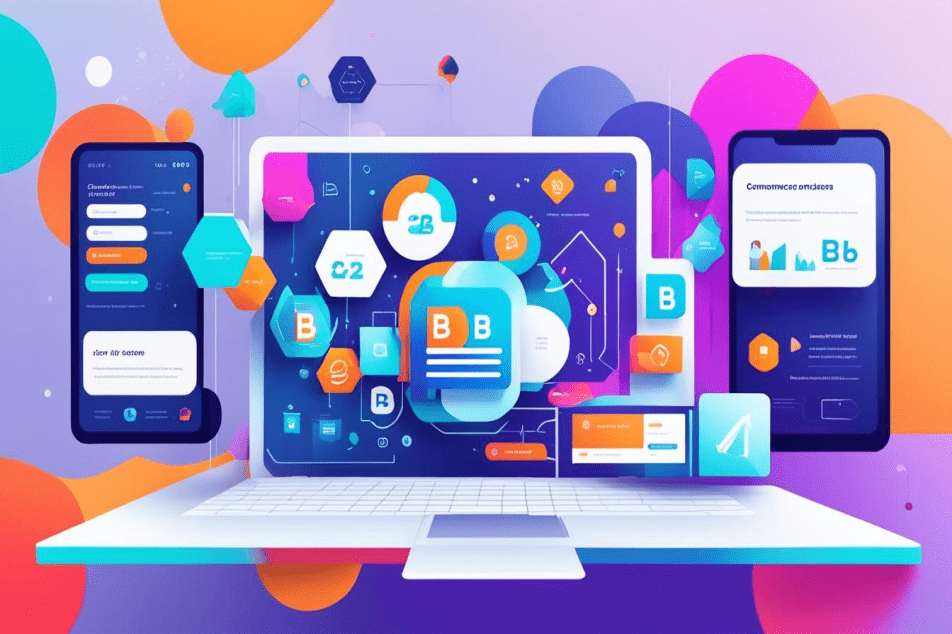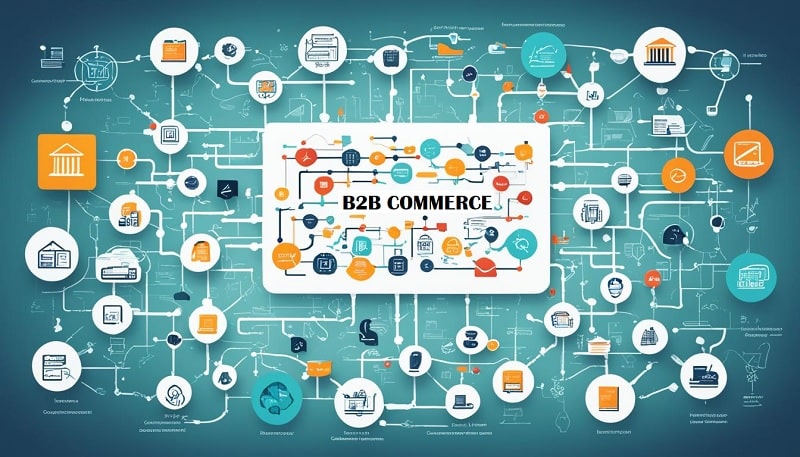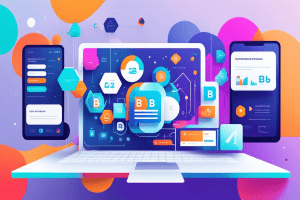
"B2B" stands for "business to business" It's about companies doing business with each other. Unlike B2C, which deals with consumers, B2B meaning is about one business selling to another For example, a wholesaler might sell large amounts to a retailer Or a manufacturer could supply parts to another company.
The Essence of B2B Commerce

In modern trade, B2B companies are crucial. They not only trade goods but also offer B2B services that help other businesses succeed. Their marketplace relies on strong relationships and understanding mutual needs through B2B sales and marketing efforts.
B2B marketing requires a special mix of knowledge and skill. It targets business entities with clear goals. These businesses look carefully at their purchases, making choices that affect their operations deeply. Marketers need to match their strategies to both the company's current and future needs.
- Raw materials procurement for manufacturing
- Broad-ranging office supplies
- Enterprise-level software and technology solutions
B2B sales cycles are long, filled with talks, checks, and deals. This process is based on mutual benefit. It makes the B2B world stable and predictable, unlike the changeable B2C markets.
| B2B Commerce Feature | Impact on Business |
|---|---|
| Long-term Partnerships | Nurtures operational dependability and strategic growth |
| Frequent & Predictable Transactions | Ensures consistent revenue streams and resource planning |
| Negotiated Agreements | Creates balanced power dynamics, catering to the bespoke needs of participating businesses |
| Diverse Service Suites | Offers scalability and adaptability to buying businesses, ranging from office essentials to technology innovations |
Both industry giants and startups explore digital marketing, financial consultancy, or logistics management. This shows how varied B2B services are. They're about more than just trading. They're about sharing visions, expertise, and successes. This makes them vital in the world of business.
Understanding B2B Ecommerce Platforms

Digital technology is transforming industries everywhere. The term what is B2B ecommerce now stands for efficiency and growth. These platforms have changed how businesses buy and sell, pointing to a new way of conducting business.
The Rise of Digital Transactions in B2B
The growth of B2B digital commerce is clear and affects many sectors. They offer convenience and advanced features, proving essential for business. Thus, operations are smooth, and the possibilities are broad.
Key Features of B2B Ecommerce Systems
Ecommerce automation is crucial for these platforms' success. It simplifies selling processes, reduces mistakes, and improves order precision. This innovation has made ecommerce systems vital for modern businesses.
They provide tailored experiences, complex pricing, and detailed analytics. These elements help businesses make smart choices and build strong customer ties.
- Personalization Capabilities
- Advanced Pricing and Discount Structures
- Real-Time Inventory Management
- Order Tracking and Fulfillment Solutions
- Customer Data Analysis and Reporting Tools
The B2B digital commerce field is growing and evolving. Using advanced ecommerce systems is essential for success in digital transactions.
The Dynamics of B2B Marketing Strategies
The world of B2B marketing is changing with the digital era. Today, companies use digital communication and social media marketing to reach specific audiences. They offer content that speaks directly to decision-makers in many fields. Through content marketing, businesses can boost their online presence and trust, offering true value beyond simple ads.
SEO, or search engine optimization, is key for marketers. It helps companies appear higher in search results, catching the eye of future partners quickly. This process combines keywords, backlinks, and top-quality content to raise visibility.
Social media marketing takes B2B outreach up a notch. Sites like LinkedIn are perfect for sharing expertise and making professional connections. They allow companies to share their brand's message and build strong relationships.
In the vast world of B2B marketing, influencer and account-based marketing (ABM) are very effective. Influencers can spread a brand's message to their followers in a real way. ABM approaches marketing messages with sharp focus, targeting very specific customer groups for better results.
Effective B2B Marketing Strategies include:
- Direct engagement through social media touchpoints
- Content-driven authority building
- SEO optimization for dynamic online visibility
- Influencer partnerships for expanded reach
- Account-based marketing for personalized campaigns
Below is a table showing different B2B marketing methods and their effects:
| Marketing Element | Audience Reach | Engagement Level |
|---|---|---|
| SEO | High | Medium |
| Content Marketing | Medium | High |
| Social Media Marketing | Varies | High |
| Influencer Marketing | Medium | High |
| Account-Based Marketing | Low | Very High |
Using these strategies well is the foundation of good B2B marketing. By looking at data and improving tactics, B2B marketers can reach beyond old limits. They deliver value that truly resonates with businesses and their changing demands.
Identifying the Main Players in B2B Transactions

In B2B commerce, two main partners are leading the show: the suppliers and the buyers. They each have a mission and a strategy, which turns the process into a complex web of talks and choices.
Roles of Vendor and Buyer Entities
A B2B business needs a good relationship between the sales team and the buyers. The sales team works hard to market their products and services. They adjust their strategies to fit what the buyers need.
On the other hand, B2B buyers are like gatekeepers. They carefully check the offerings to make sure they match their company's needs.
B2B Buying Committees and Decision-Making
The buying committee is made up of experts from different areas. Their job is to look over purchases and make smart choices for their company. This group usually has people from business, technical, and financial areas.
For big purchases, these buyers might ask for a Request for Proposals (RFP). An RFP lets them get detailed offers from suppliers in a clear way. They match these offers against their detailed needs.
- Analyze supplier stability and market reputation
- Review of product specifications and compatibility with existing systems
- Consideration of pricing, contractual terms, and ROI
- Evaluation of post-purchase support and customer service
This decision-making process shows why it's important to understand B2B sales and purchases well. It's all about knowing the needs and challenges of both suppliers and buyers.
Why 'What is B2B' Should Matter to You

Understanding B2B importance goes beyond just knowing a business model. It's about seeing the backbone of company interactions and growth in a detailed marketplace. Unlike B2C, B2B commerce benefits create strong B2B business relationships. These relationships are vital for exchanging goods and services. They also create networks essential for innovation, efficiency, and market stability.
B2B business relationships are key to industry advancement. They are based on trust and understanding, sometimes lasting decades. This stability leads to better forecasting. It's essential for strategic planning and investment. These partnerships shape a business's market stance.
- Increased order volume and longer contracts lead to stronger revenue consistency.
- Networking through B2B channels can foster innovations and collaborations that push industries forward.
- Deepened understanding of business needs leading to improved product and service offerings.
The B2B commerce benefits shine in streamlining operations. This lets businesses focus on core competencies, strategic growth, and market expansion. Operational efficiency can reduce costs and boost profitability. This gives businesses a competitive edge.
In conclusion, knowing the B2B importance helps businesses grasp long-term industry opportunities. Leveraging B2B interactions sparks mutual growth. Every entity in the network benefits, achieving both individual and collective success.
Diving Deeper into B2B Industries and Markets

The B2B industries landscape is both broad and complex. It covers essential sectors crucial to our global economy. These range from the strong technology sector to the closely connected manufacturing area, each with its own traits, challenges, and chances.
In the technology sector, companies use B2B commerce to get advanced software, such as CRM systems. These systems help manage customer interactions. They also buy infrastructure that keeps data centers running smoothly. This sector's growth depends heavily on B2B transactions.
- CRM Software Solutions
- Data Center Infrastructure
- Enterprise Security Platforms
The manufacturing industry is a prime example of B2B interactions. Here, manufacturers work with suppliers to get raw materials, components, and machines. They use these to make their final products. These products often get sold to other businesses for further processing or resale.
- Material Sourcing
- Component Outsourcing
- Heavy Machinery Acquisitions
In marketing and advertising, services are designed to be sold to other businesses. This shows the wide impact of B2B strategies. B2B marketing firms use creative campaigns and digital methods. They help businesses grow their voice and reach more of the market.
Specialized B2B markets serve niche industries with custom goods and services. They focus on understanding their customers' specific needs. Their aim is to offer solutions that are just as unique.
| Industry | Key B2B Interactions | Example Products/Services |
|---|---|---|
| Technology | Software and Infrastructure | CRM systems, cybersecurity solutions |
| Manufacturing | Materials and Machinery | Raw materials, industrial robots |
| Marketing and Advertising | Campaign Design and Execution | Digital marketing services, market research |
| Specialized Industries | Custom Solutions | Industry-specific software, consultancy services |
Understanding the details in B2B industries is crucial. This is especially true for the technology sector, manufacturing, and marketing and advertising areas. With the right knowledge and approaches, businesses can move through the complex B2B world. This allows them to grow and build important business relationships.
Comparing B2B and B2C: A Clear Distinction

It's important for companies to know the difference between business-to-business (B2B) and business-to-consumer (B2C). How B2B differs from B2C can be seen in many ways. Understanding these differences helps in marketing, sales, and how to serve customers.
Pricing Structures and Order Complexities
B2B deals usually have complex prices and negotiation. They often come with personalized pricing for large orders. On the other hand, B2C sales have set prices for each consumer's simple buying needs. Below is a table showing how they differ in operation:
| Aspect | B2B Transactions | B2C Transactions |
|---|---|---|
| Pricing | Negotiated, volume-based | Standard, item-based |
| Order Volume | Bulk purchases | Single-item orders |
| Sale Complexity | High (multiple decision-makers) | Low (individual consumer) |
| Technology Requirements | Advanced platforms for order management | Simpler, user-friendly interfaces |
Understanding the Buyer's Journey in B2B vs B2C
The B2B customer journey is longer and needs more info and help along the way. In contrast, what is B2C is about fast sales and buying on feeling. This means each needs its own way to reach customers.
Here are the main steps of the customer journey:
- Awareness: Both start with awareness but in different ways; B2B uses specific industry content, while B2C uses ads and social media.
- Consideration: B2B buyers look for detailed info and case studies, but B2C shoppers focus on reviews and ratings.
- Decision: B2B involves demos and proposals, unlike B2C's quicker purchases.
- Retention: B2B aims to build long-term relationships, while B2C seeks re-engagement and loyalty.
By looking closely at B2B and B2C, companies can craft their strategies for each market. They can provide the right support, whether it's a business looking for a partnership or a consumer making a quick buy.
Expanding Your Business with B2B Ecommerce Solutions

The digital commerce scene is always changing. This change opens the door for businesses to grow through smart B2B ecommerce solutions. Today, companies can use advanced sales automation and ecommerce platforms. They help businesses reach out, boost efficiency, and stand out from the competition. Adopting these new solutions can change the game. It can lead to significant online growth for B2B companies.
Automating Sales and Streamlining Operations
Automation is changing the game in B2B sales. It makes customer service consistent, manages complex sales, and helps nurture leads with less work. This makes everything run smoother and reduces mistakes. It saves time. And it makes it easier for businesses to grow. With automation, companies can focus more on what they do best. This is key for expanding your business.
Scaling Your B2B Sales Online
Growing your business today means being strong online. And B2B ecommerce solutions are vital for this. They're built for the big tasks of B2B sales. They help companies handle large orders, be available all the time, and cater to customers' specific needs. This is crucial for reaching new markets. It makes sure businesses can adapt and lead in today's fast-paced global market.
Have you ever been involved in a B2B transaction?








